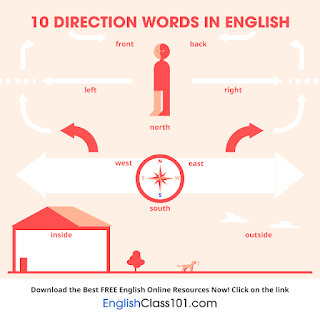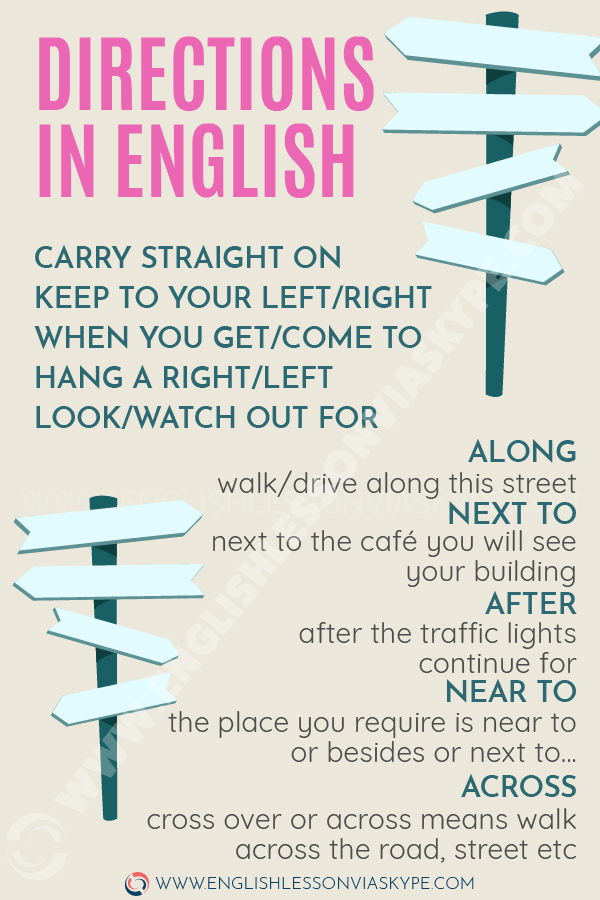Asking for directions
When you ask for directions, remember above all to be polite. So start by saying one of the following phrases:
- Hello. Can you help me, please?
- Good morning. May I ask for some help?
- Excuse me, could you help?
Once you have someone’s attention, you can ask for help to reach your destination. You can do that by using one of these phrases:
- Could you tell me how to get to the bank?
- Do you know where the museum is?
- We can’t find the subway station. Is it near here?
- Where can we find a park near here?
If you’re not sure you’re going in the right direction, you can make sure by asking:
- Are we on the right road to the city center?
- Is this the right way to the mall?
- What’s the best way to get to the airport?
Giving directions
In the same way that you need to ask directions when you travel abroad, foreigners visiting your city might ask you directions, and what better way to practice English than to help them? 🙂
Here are some common phrases you can use:
- Go past the cinema. (Pass the cinema.)
- Go along this road.
- Go straight on/ahead. (Stay on this road – don’t turn.)
- Go through the tunnel.
- At the roundabout, take the first exit.
- Turn left at the crossroads.
- Take the second right.
- It’s on your left.
- You’ll see it in front of you.
- It’s on the other side of the road.
- You’re going the wrong way.
Google Maps (Paris) - give directions to get around the city

The most important words and phrases are:

It’s also helpful to know some common places people visit in a city, such as the following:

Here are some examples:
- Go along the street until you reach the traffic lights.
- You’ll see a bank on the left.
- It’s about two blocks from here.
- I prefer going to the airport on the highway because it’s faster.
Some prepositions and adverbs can also help when you’re giving directions:

For example,
- My office building is in front of the mall.
- Go straight on for about one kilometre.
- The cinema is next to the bank.
- Housing, neighborhoods and directions lessons
- 9 Transportation and Getting Around Exercises and Worksheets
- Directions - prepositions
- Giving and asking for directions
- How to give directions
- Giving Directions - exercise
- Giving Directions - speaking game
- Talk English - directions
- BBC - giving directions
- About.com - directions
- Directions - basics
- Giving Directions
- Business English - directions
- town map
- Directions game
- Directions - Dropbox
- Direction worksheets and exercises **
Housing, neighborhoods and directions lessons

ESL teaching exercises/worksheets for neighborhoods, homes and "where we live"
Other teaching ideas for communities, transportation, homes and "where we live"
Giving Directions: mapping lessons & other ideas for ESL teachers
Vocabulary
Travel (noun)
| Collocation | Example |
| travel documents | Once I forgot my travel documents and I missed my flight. |
| air/rail/space travel | Air travel today is easier and more affordable than ever before. |
| overseas/international/foreign travel | International travel allows us to see the world and learn about different cultures. |
| leisure/holiday travel | In my experience, holiday travel with small children is often stressful. |
| travel arrangements/plans | Making travel arrangements requires thorough planning: choosing travel dates, making reservations and planning activities. |
| travel agency/agent | I have used travel agencies to help me plan trips in the past, but I prefer to do it myself. |
travel (verb)
| Collocation | Example |
| travel abroad | Travelling abroad has made me better appreciate my home country. |
| travel on business | As a sales representative, I have to travel on business from time to time. |
| travel to (somewhere) | I’ve always wanted to travel to Australia. |
| travel around/across/through (somewhere) | We travelled through Portugal and into Spain. |
| travel by air/train/car/on foot | We decided to travel by train since none of us wanted to drive |
| travel light | I always try to travel light. |
| travel the world | I wish I could travel the world. |
holiday (noun)
| Collocation | Example |
| go on/have/take a holiday | I haven’t taken a holiday since I started my own business. |
| holiday destination | In my opinion, tropical islands make for the best holiday destinations. |
| holiday arrangements/plans | I believe that proper holiday arrangements are essential to making sure that everything goes smoothly on your holiday. |
| holiday photos/pictures | People are often more concerned about taking the perfect holiday photo than enjoying the moment |
| summer holiday | Summer holidays are usually enjoyable and fun-filled. |
| camping/skiing holiday | I learned to ski on my first skiing holiday in Canada. |
holiday (verb)
| Collocation | Example |
| holiday in (somewhere) | We are holidaying in Mexico this year. |
Vocabulary sets related to travel & holidays
Now that we have looked at using the words ‘travel’ and ‘holiday’ in a variety of contexts, it’s time to explore two relevant sub-topics that can also help you to talk or write about travel and holidays on your IELTS. Keep in mind that this common theme may come up in any of the three parts of the Speaking module of the test: from talking about your travel experiences, to describing your dream holiday, to discussing international travel in more depth. In addition, you may have to write about travel and holidays for Writing Task 2.
1. Tourism & holidays
| word/phrase | part of speech | meaning | common collocations | example | pronunciation |
| campground (or campsite) | noun | a place where people can camp when on holiday | forest/beach/lake/ mountain/river campground, family campground | What I like the most about spending the summers in BC is its many beautiful family campgrounds. | /ˈkæmp.ɡraʊnd/ |
| touristy | adjective | a place where a lot of tourists go and it has many things for them to buy and do (often seen as something negative) | touristy area/place/town | My hometown used to be a pretty little town, but now it’s become very touristy. | /ˈtʊr.ɪ.sti/ |
| ecotourism | noun | going on holiday to places of natural beauty in a way that causes less damage to the environment | ecotourism industry, ecotourism destination, encourage ecotourism, | The ecotourism industry keeps growing as more and more people become aware of how damaging tourism can be to the environment. | /ˈiː.koʊˌtʊr.ɪ.zəm/ |
2. Holiday arrangements
| word/phrase | part of speech | meaning | common collocations | example | pronunciation |
| book | verb | to arrange to have a seat, room, etc. at a specific time in the future | book a flight/tickets/seats/a room, book early/in advance, book in/into (somewhere), be booked up/be fully booked | We wanted to stay at a hotel downtown but they were fully booked. | /bʊk/ |
| in season (antonym: out of season) | noun | at the time of year when people want to travel or take a holiday | other collocations with ‘season’: holiday/summer/tourist season, high season, low season, off-season | Naturally, hotel rooms are much more expensive in season. | /ˈsiː.zən/ |
| rental | noun | an arrangement to rent something such as a house, car or bike | house/property rental, car/bike/boat rental, rental company | When planning a holiday, I always look for house rentals near the city. | /ˈren.t̬əl/ |
- Directions 1 (easy) - Révision des prépositions et des magasins (esl-lab)
- Directions 3 (medium) - Révision des prépositions (esl-lab)
- Directions 2 (difficult) - Utilisation des prépositions (esl-lab)
- A story with a cat and a mouse - read to you. (révision des prépositions) - (kizclub)

- Directions (with exercises) - (esl-lab) :
- Directions 1 (E)
- Getting Around Tokyo (E)
- Directions 3 (M)
- Where's the movie theater? (D)
- Directions 2 (D)
- Taking the Train (E)
- All About Prepositional Phrases, with Over 60 Examples

"This article contains every common preposition in the English language. Isn’t it nice to know that you can learn them all?
A list of every common verb or every common noun would be very long…"
+ List of Prepositions and Prepositional Phrases Examples
(dailywritingtips.com) - SOME OTHER IMPORTANT IDEAS in PICTURES : Pronouns, Operators, Directions
(ogden.basic-english.org)
- Directions - a lesson with AUDIO
- with a fun test at the end (learnenglish.de)
- Prepositions with pictures (Enchanted Learning)

- Prepositions of Spatial Relationship (with pictures) - (owl.english.purdue.edu)

- Learn English - Prepositions of Place (with pictures) - (learnenglish.de)

- Savoir se repérer dans une image (erp.oissel.onac)

- Learn English - Prepositions of Time (with pictures) - (learnenglish.de)

- Infographic featuring the different prepositions used for time

(grammarcheck.net)
- Preposition-Dependent Verbs and Adjectives (sk.com.br)
- Voici 4 exercices interactifs pour apprendre les directions

Créés par Laurence Haquet (Ac. Rouen) - Prepositions of place
Created by Laurence HAQUET (Ac. Rouen) - In the countryside (prepositions and directions) - with a game and short recordings to fill in 10 sentences.
Created by Renée Maufroid. (Ac. Lille)




